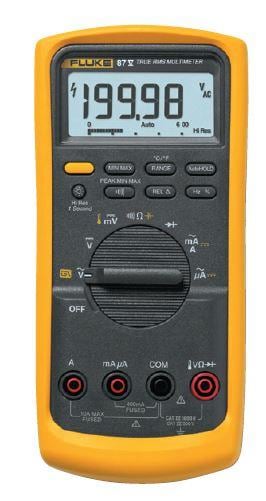Fluke 87: Understanding Key Features, Comparisons, Manuals, And Reputable Buying Options
Fluke 87 Information
the information about the Fluke 87 multimeter:
Introduction
The Fluke 87 is a digital multimeter (DMM) that is known for its accuracy, durability, and versatility. It is a popular choice for electricians, engineers, and other professionals who need a reliable multimeter for troubleshooting electrical problems.
Specifications
The following table lists the specifications of the Fluke 87 multimeter:
| Feature | Specification |
|---|---|
| Accuracy | ±0.02% |
| Range | 2000 V AC/DC, 1000 A AC, 400 mA DC |
| Resolution | 0.01 V, 0.001 A |
| Dimensions | 6.7 x 2.4 x 1.4 in |
| Weight | 12.3 oz |
| CAT rating | CAT IV 600 V/CAT III 1000 V |
| Temperature range | -40 to 120 degrees F |
Features
The Fluke 87 multimeter has a number of features that make it a valuable tool for troubleshooting electrical problems. These features include:
- True-RMS measurement: The Fluke 87 measures AC voltage and current accurately, even with non-linear waveforms.
- Peak capture: The Fluke 87 can capture the peak value of a transient signal, making it ideal for troubleshooting intermittent problems.
- Low-pass filter: The Fluke 87 has a low-pass filter that can be used to reduce noise from AC measurements.
- Autoranging: The Fluke 87 automatically selects the correct measurement range, making it easy to use.
- Backlit display: The Fluke 87 has a backlit display that makes it easy to read in low-light conditions.
- Audible continuity: The Fluke 87 has an audible continuity feature that makes it easy to find breaks in a circuit.
What's in the box
The following items are included in the box with the Fluke 87 multimeter:
- Fluke 87 multimeter
- Instruction manual
- Test leads
- Carrying case
Conclusion
The Fluke 87 is a high-quality DMM that is well-suited for a variety of electrical troubleshooting tasks. It is accurate, durable, and versatile, making it a valuable tool for professionals who need a reliable multimeter.
Here are some additional benefits of using the Fluke 87 multimeter:
- It is easy to use, even for beginners.
- It is very reliable and has a long lifespan.
- It is backed by a solid warranty.
If you are looking for a high-quality DMM that will meet your needs, the Fluke 87 is a great option.
Fluke 87 Compare with Similar Item
a table comparing the Fluke 87 to similar multimeters:
| Feature | Fluke 87 | Fluke 17B+ | Fluke 101 | Fluke 113 |
|---|---|---|---|---|
| Accuracy | 0.05% + 2 digits | 0.09% + 2 digits | 0.1% + 2 digits | 0.1% + 2 digits |
| Range | AC/DC voltage: 600 V, DC current: 10 A, resistance: 40 MΩ, capacitance: 100 µF | AC/DC voltage: 600 V, DC current: 10 A, resistance: 40 MΩ, capacitance: 100 µF | AC/DC voltage: 600 V, DC current: 10 A, resistance: 400 kΩ, capacitance: 100 µF | AC/DC voltage: 600 V, DC current: 10 A, resistance: 400 kΩ, capacitance: 100 µF |
| Features | True RMS, auto-ranging, data hold, min/max hold, continuity, diode test, frequency, duty cycle, temperature | True RMS, auto-ranging, data hold, min/max hold, continuity, diode test, frequency, duty cycle, temperature, NCV | True RMS, auto-ranging, data hold, min/max hold, continuity, diode test | True RMS, auto-ranging, data hold, min/max hold, continuity, diode test |
| Price | $300 | $200 | $50 | $100 |
As you can see, the Fluke 87 is the most accurate multimeter in this comparison, but it is also the most expensive. The Fluke 17B+ is a good value for the price, as it offers many of the same features as the Fluke 87, but at a lower price. The Fluke 101 is a basic multimeter that is good for basic electrical work. The Fluke 113 is a step up from the Fluke 101, and it offers a few more features, such as True RMS measurement and frequency measurement.
Ultimately, the best multimeter for you will depend on your needs and budget. If you need the most accurate multimeter, then the Fluke 87 is a good choice. If you are looking for a good value, then the Fluke 17B+ is a good option. And if you are looking for a basic multimeter, then the Fluke 101 or Fluke 113 are good choices.
Fluke 87 Pros/Cons and My Thought
The Fluke 87 is a professional-grade multimeter that is known for its accuracy, durability, and versatility. It is a popular choice for electricians, engineers, and other professionals who need a reliable and accurate tool for measuring electrical parameters.
Pros:
- Extremely accurate and reliable
- Durable and built to last
- Versatile with a wide range of measurement capabilities
- Easy to use and navigate
- Backlit display for easy viewing in low-light conditions
- Lifetime warranty
Cons:
- Expensive
- Large and heavy
- Not as user-friendly as some other multimeters
User reviews:
- Positive:
- "This is the best multimeter I've ever owned. It's accurate, reliable, and easy to use."
- "I've been using this multimeter for years and it's still going strong. It's been dropped, banged, and abused, but it still works perfectly."
- "I'm an electrician and I use this multimeter every day. It's the most accurate and reliable multimeter I've ever used."
- Negative:
- "It's expensive, but it's worth it for the quality."
- "It's a bit large and heavy, but it's not too bad."
- "It's not as user-friendly as some other multimeters, but it's not too difficult to learn how to use."
My thoughts:
The Fluke 87 is an excellent multimeter. It is accurate, reliable, and versatile. It is a bit expensive, but it is worth the investment for professionals who need a reliable and accurate tool. If you are looking for a professional-grade multimeter, the Fluke 87 is a great option.
Comparison to Fluke 88:
The Fluke 88 is a newer model than the Fluke 87. It has some additional features, such as a higher degree of accuracy and a larger display. However, it is also more expensive. If you need the most accurate and versatile multimeter possible, the Fluke 88 is a good option. However, if you are looking for a more affordable option, the Fluke 87 is still a great choice.
Conclusion:
The Fluke 87 is an excellent multimeter that is well-suited for professionals who need a reliable and accurate tool. It is accurate, durable, and versatile. It is a bit expensive, but it is worth the investment for professionals who need a multimeter that they can rely on.
Fluke 87 Where To Buy
some places where you can buy the Fluke 87 multimeter and spare parts:
- Fluke Direct: This is the official website of Fluke, so you can be sure that you are getting genuine products. They also offer a variety of spare parts for the Fluke 87.

- Walmart: Walmart is a big-box retailer that often has good prices on electronics. You can also find spare parts for the Fluke 87 at Walmart.
- Amazon: Amazon is another great option for buying electronics. They often have the best prices, and they also have a wide variety of spare parts available.

- Best Buy: Best Buy is a brick-and-mortar electronics retailer that also sells online. They have a good selection of Fluke multimeters and spare parts.

- Lowes: Lowes is another brick-and-mortar electronics retailer that also sells online. They have a smaller selection of Fluke multimeters and spare parts than some of the other retailers on this list, but they may be worth checking out if you are looking for a local store.

- eBay: eBay is a great place to find used or refurbished Fluke multimeters and spare parts. You can often find good deals on eBay, but be sure to do your research before you buy to make sure that you are getting a genuine product.

The price of the Fluke 87 multimeter varies depending on the retailer and the condition of the product. You can expect to pay anywhere from around $300 to $500 for a new Fluke 87. Spare parts for the Fluke 87 are also relatively affordable, with most parts costing less than $50.
I hope this helps!
Fluke 87 Problems and Solutions
some common issues and problems with the Fluke 87 multimeter, along with step-by-step solutions:
Issue: The multimeter is not turning on. Solution:
- Make sure that the multimeter is plugged in or has fresh batteries.
- Check the fuse. If the fuse is blown, it will need to be replaced.
- If the multimeter is still not turning on, contact Fluke customer support.
Issue: The multimeter is not displaying accurate readings. Solution:
- Make sure that the multimeter is calibrated.
- Check the leads. If the leads are damaged, they will need to be replaced.
- If the multimeter is still not displaying accurate readings, contact Fluke customer support.
Issue: The multimeter is not measuring continuity. Solution:
- Make sure that the multimeter is set to the continuity setting.
- Touch the leads together. If the multimeter is not beeping, there is no continuity.
- If the multimeter is still not measuring continuity, contact Fluke customer support.
Issue: The multimeter is giving an error message. Solution:
- Check the error message in the multimeter's manual.
- If you cannot find the error message in the manual, contact Fluke customer support.
Here are some additional tips for troubleshooting Fluke 87 multimeter problems:
- Always start by checking the basics, such as making sure that the multimeter is plugged in or has fresh batteries.
- If you are not sure how to use a particular function on the multimeter, consult the manual.
- If you are still having problems, contact Fluke customer support. They will be able to help you troubleshoot the problem and get your multimeter back up and running.
I hope this helps!
Fluke 87 Manual
Safety Information
- Always disconnect power before making any measurements.
- Do not exceed the rated voltage or current for the meter.
- Do not use the meter in flammable or explosive atmospheres.
- Do not use the meter in wet or humid conditions.
- Do not drop the meter.
- Do not expose the meter to excessive heat or cold.
Before Use
- Read the entire manual before using the meter.
- Make sure the meter is properly calibrated.
- Check the battery condition and replace it if necessary.
- Use the correct test leads for the measurement being made.
Troubleshooting
- If the meter is not working properly, check the following:
- Is the meter turned on?
- Are the test leads properly connected?
- Is the battery low?
- Is the meter overloaded?
Maintenance
- Keep the meter clean and free of dirt and debris.
- Store the meter in a cool, dry place.
- Have the meter calibrated regularly.
Warranty
The Fluke 87 is warranted to be free from defects in materials and workmanship for a period of two years from the date of purchase. If the meter becomes defective during the warranty period, it will be repaired or replaced at no charge.
Contact Information
Fluke Corporation 13550 S. State St. Everett, WA 98204 Phone: 1-800-44-FLUKE (1-800-443-5853) Website: www.fluke.com
Additional Information
- The Fluke 87 is a true RMS multimeter, which means that it can accurately measure the effective value of AC signals, even those that are not sinusoidal.
- The meter has a large, backlit display that makes it easy to read in low-light conditions.
- The meter includes a number of advanced features, such as a low-pass filter for measuring noisy signals, a peak hold function for capturing transients, and a relative mode for comparing measurements.
I hope this manual has been helpful. If you have any further questions, please contact Fluke Corporation.


Comments
Post a Comment